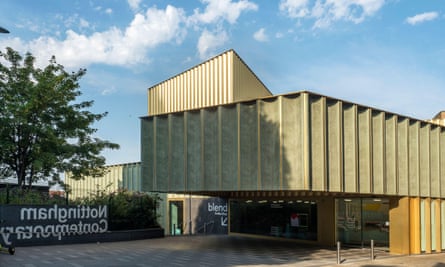The chill blast of damaging cuts to provincial arts venues has returned to Berkshire this weekend as the cash-strapped local authority becomes the latest to scrap its cultural budget.
Local MP and former prime minister Theresa May was among those to salute a reprieve back in February. But theatre lovers in the Royal Borough of Windsor and Maidenhead now fear their venues are in jeopardy again, since no cultural funds appear in the next budget.
The council does plan to keep its arts centres and theatres open for another year, the Observer has learned, by leaning on maintenance funds or using grants from private developers.
It follows an alarm call last week from further east in Suffolk, where Ipswich’s New Wolsey Theatre is dealing with the complete axing of county funding. Suffolk’s decision to drop dedicated arts funding comes after even more radical moves from councils including Bristol, Nottingham and Birmingham.

Loss of local support for the arts is a symptom of the increasing number of councils facing bankruptcy after more than a decade of central funding cuts dating back to the austerity drive ordered by the Conservative-led coalition government.
Spending on each resident by English councils, excluding education, fell by almost a quarter in real terms between 2009-10 and 2019-20, according to the Institute for Fiscal Studies. Some council leaders now warn they are struggling to meet their legal obligations to care for vulnerable children and adults.
In this economic climate, arts campaigners and performers fear the lights will soon go out in a string of venues across England, Wales and Northern Ireland. To survive, those theatres will have to drastically reduce their work.
“This funding crisis is fast becoming a national emergency,” said Jack Gamble, the director and CEO of Campaign for the Arts, adding that, while he sympathised with the “tough situation” some councils are in, “this can’t be the answer”.
“Local authorities are the biggest public funders of the arts,” he said. “They play an absolutely vital role in keeping spaces open, services running and creativity thriving – but in real terms, English councils have almost halved their cultural investment since 2010.”
When Windsor and Maidenhead council backtracked last year, restoring some arts funding, May said she was “incredibly pleased”, adding: “Norden Farm Centre for the Arts is invaluable.”
This weekend, councillor Joshua Reynolds, a Liberal Democrat cabinet member for communities and leisure, wanted to allay fresh worries: “It may look as if the arts budget is not there, but we will use other funds from developers and then work over this year to find a new scheme to support Norden Farm. And the council actually owns the Old Court as well as Theatre Royal Windsor, so there we can use building maintenance funds.”
But wider prospects remain bleak. In his first 2024 editorial for the journal Arts Professional, Neil Puffett made regional and civic funding top priorities: “Pressure on grassroots arts organisations is likely to increase as much of local government is facing bankruptcy and the prospect of cutting all non-statutory spending,” he wrote this weekend, urging central government to safeguard cultural venues across the country.
Speaking from the eye of the Suffolk arts storm, artistic director Douglas Rintoul said he believes the New Wolsey Theatre he runs will manage to stay open, despite an 11% cut to its overall subsidies. “On top of previous cuts it means we have no wiggle room and must make very difficult decisions. It’s a shock, particularly after the pandemic.”
Funding from Ipswich borough council will continue, but without the venue’s usual “triple lock” of secured national, county and civic funding, it will be harder to bring in further grants. “People are responding to the threat, which is good,” said Rintoul. “But Ipswich is not like the rest of the county. One-third of the young people here are living in poverty, and there are no high-net-wealth individuals [who can] donate, or major local businesses.”
In Nottingham, where grants to the Playhouse and Nottingham Contemporary are in doubt from April, the fact that the council’s funding for the city’s food bank is also in peril highlights a problem arts campaigners often face. If cash is scarce, how can they compete with services for people in dire need?
Rintoul thinks the best response was laid out in a 2017 all-parliamentary inquiry into the value of the arts. “It showed how culture brings in investment and solves social problems. But there is a lack of willingness to accept the arts can help,” he said.
“Suffolk want us to find alternative ways to fund our community work, but we are doing that already. There is social prescribing from the NHS, for example. The NHS understands the value of the arts – why can’t the council? It seems so short term.”
In September cultural bodies, including the actors’ union Equity and the Campaign for the Arts, issued an urgent plea for parliament to step in and protect local arts funding, warning then that “treasured theatres” up and down the country were in trouble. Since then in December Clare Reddington, chief executive of Bristol’s Watershed cinema, has complained her city council “doesn’t have a clear cultural strategy”.
Speaking to the Stage this month, Gamble identified a lack of local funds as the looming danger. “As pressures mount on the services councils have legal duties to provide – especially social care – there are growing risks to everything else. Some councils, such as Birmingham and Nottingham, have effectively declared bankruptcy. Now, more than ever, we need to speak up for councils’ vital role in local cultural access and funding.”
Bagikan Berita Ini














0 Response to "‘A national emergency’: UK theatres fear closure after more local funding cuts - The Guardian"
Post a Comment